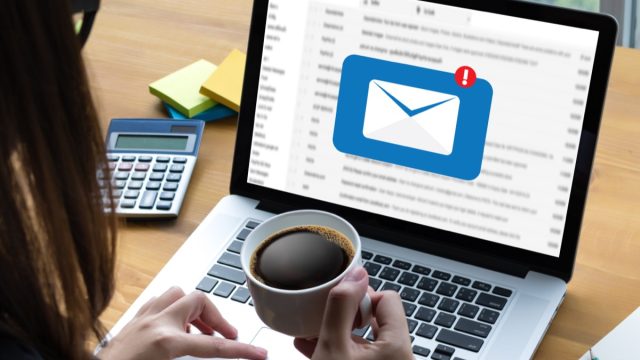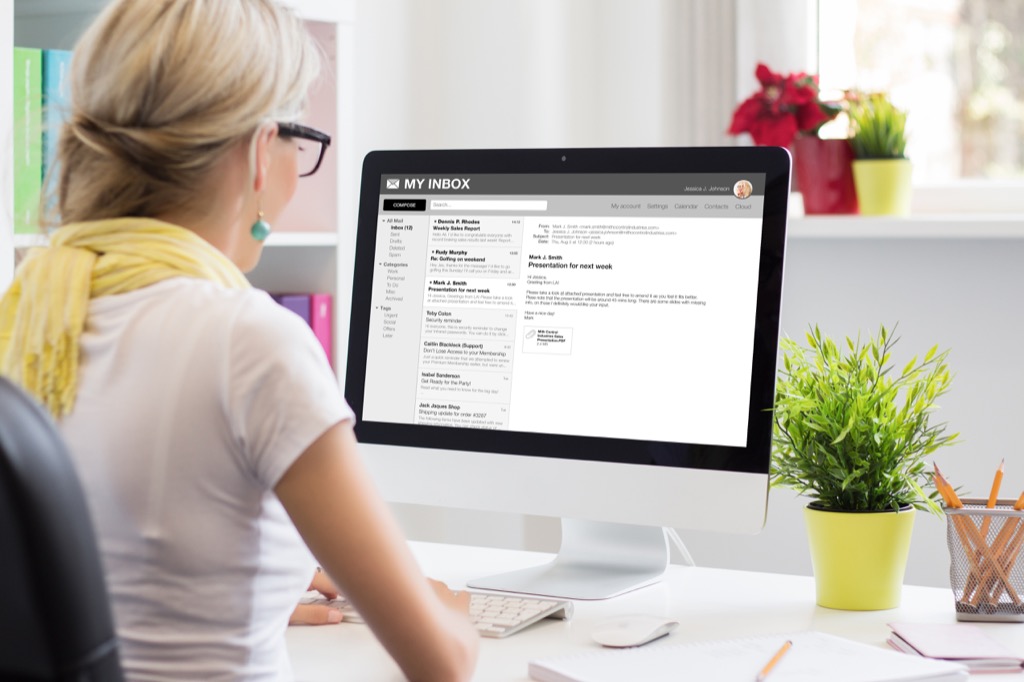6 "Polite" Emails You're Sending That Are Actually Offensive
Here's how to avoid a problem, etiquette experts say.

Our world and communications are increasingly digital, with email being among our most common means of messaging. That said, some of us haven't exactly mastered the medium—it's still all too easy to step on toes without realizing we've caused any offense at all. That's why, if you've ever had an email exchange go awry, it may be time to take stock of your emailing habits. We checked in with etiquette experts to learn which types of "polite" emails are most likely to offend. Read on to find out if you're making these eight common mistakes.
RELATED: 7 "Polite" Tipping Habits That Are Actually Offensive, Etiquette Experts Say.
1
Critical feedback

If part of your job is to provide feedback to others, it may seem easiest and kindest to put your thoughts in an email. However, Jodi RR Smith, founder of Mannersmith Etiquette Consulting, says this is actually a major oversight.
"There are three major components of our interpersonal communication. They are body language, tone of voice, and the words we use. The more subjective the message, the more we want to be sure to use all three," she tells Best Life.
That's why any critical feedback should be offered as an in-person conversation, even if that makes it feel more personal. "This allows the giver to ensure the message is received and allows the recipient to ask clarifying questions," she notes.
RELATED: 8 Times You Need to Stop Apologizing, Etiquette Experts Say.
2
"Just following up" too soon

It may seem polite to follow up on an email that hasn't yet gotten a response, but Jules Hirst, founder of Etiquette Consulting, says that if you do so too soon, you're definitely risking offense.
"Following up is important, but when done too soon it makes the recipient feel rushed or feel that there is a lack of trust—both of which are offensive," she explains.
3
Late-night messages

If you're sending a business email, it's best to do so during business hours. This signals to the recipient that you don't expect them to respond to you when they're off the clock.
However, Hirst says this rule should also apply more generally. Unless the person is awaiting your response or the email is time-sensitive, you should avoid late-night emailing altogether, she says.
"You should have a cutoff time for emails so you are not bothering people late at night," she suggests. "Some people have their notifications on and will be 'dinged' each time you send an email. Schedule your emails to go out the next morning to not offend anyone."
RELATED: 6 Questions You Should Never Ask at a Dinner Party, Etiquette Experts Say.
4
CC'ing the boss

Strategically copying a boss or colleague on an email to sway things in your favor is one of the most glaring offenses regarding work emails. However, you might not realize you're giving the impression of calculation if you simply intended to include all relevant parties.
"If someone is not responding to your emails, it is offensive to send another request and CC: that person's boss in an attempt to make them do what you want. Nobody likes a tattletale. If you cannot settle something over email, pick up the phone and try to work it out that way," advises Hirst.
RELATED: 10 "Polite" Compliments You're Giving That Are Actually Offensive.
5
"Not sure if you saw my last email…"

You may think that beginning an email like this lets the recipient off the hook for their non-response, but it actually brings their error to the forefront.
"Making this statement implies that the recipient is neglecting their work by not answering your email," says Hirst. "Do not assume they are sitting around doing nothing. Maybe there are more important issues at hand."
6
Anything with a read receipt

Read receipts allow the sender to know whether an email has been opened—but Hirst advises against using this tracking tool: "Nothing is more offensive than opening an email to be told that the sender requested a read receipt. Nobody likes to be monitored or feel like they are not trusted."
For more etiquette tips sent directly to your inbox, sign up for our daily newsletter.





















